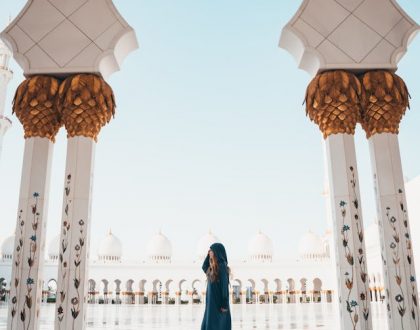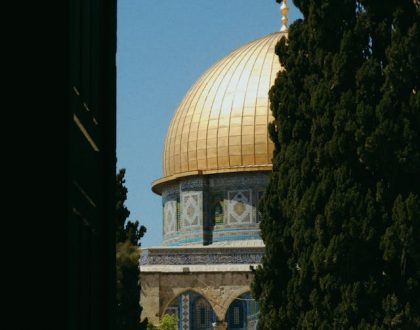Hijrah and Muharram: An invitation to reform

Why we talk about Hijrah in Muharram
Although we often talk about the Hijrah in Muharram, it is important to clarify that the Hijrah actually took place at the end of Safar and the beginning of Rabi’ al-Awwal. The reason we celebrate it in Muharram is because it is the beginning of the new year – a time for renewal and a good time to reflect on the story of the Prophet Muhammad’s (peace be on him) migration.
Prophets were sent to reform their communities
Thirteen years after revelation, during which the Prophet (peace be upon him) was exposed to agression and torture, the protection of his uncle, Abu Talib had shielded him from the worst attacks. Although this wasn’t always the case, and he was still confronted and humiliated on many occasions.
Prophets bring reform
The Hijrah was all about reform, which is a story that repeats itself throughout history. Allah sent prophets and messengers to every community to reform them. When they diverted from the path of Allah, he would send prophets to bring them back to the truth and clarify the path again for them. But because Prophet Muhammad (peace be on him) is the final messenger, no other will come after him. He stated this clearly:
There will be no prophet after me. [Bukhari]
Therefore, his story was all about bringing the final truth to the people. He wanted to bring justice to the community, and justice to those who were oppressed. The main headlines of his message were about monotheism, fairness, and goodness. It was a message of mercy and love, and treating one another with respect and dignity.
The struggle to disseminate the message
The leaders of Makkah did not like the Prophet (peace be upon him) challenging their authority. They did not allow him to deliver his message peacefully and safely in the community; instead they blocked him and argued against him. They accused him of being a sorcerer, a madman, and a poet. For thirteen years he was struggling and striving in the centre of Makkah and in the outskirts, but he couldn’t penetrate their stubborn refusal to accept the truth.
Of course, we don’t have accurate statistics, but we have some studies that estimate there were around three thousand to five thousand people living in Makkah at the time. Of those how many people accepted the Prophet’s (peace be on him) message? Only about 100 to a maximum of 150.
The Prophet (peace be upon him) felt that he wasn’t getting the divine message to the people, but he did not give up. He tried and tried, and the last attempt was when he visited Ta’if. This was the worst day of his life, and finally Allah Almighty gave him permission to leave Makkah.
The Prophet (peace be on him) knew he would be driven out
This had been the prophecy of Waraqah bin Nawfal. The first time the Prophet (peace be on him) received the message, he was terrified, and Khadija (may Allah be pleased with her) took him to her cousin, who was a wise scholar. Waraqah confirmed that this was revelation from Allah, but warned that Quraysh would eventually expel him from the city.
Waraqa said, “I wish I were young and could live up to the time when your people would turn you out.” Allah’s Messenger (ﷺ) asked, “Will they drive me out?” Waraqa replied in the affirmative and said, “Yes, for nobody brought the like of what you have brought, but was treated with hostility.” [Bukhari]
So the Prophet (peace be on him) knew to expect resistance, however he had not known it would be so much. He knew he had to leave Makkah, but he didn’t know where to go. He knocked on every door, except Yathrib, as it was called at that time. It didn’t even cross his mind, but this is the way: you plan something, and Allah’s plan overtakes your plan.
Then in Dhul Hijjah, two years before the migration, a group of people came from Yathrib. They met the Prophet (peace be on him) and gave bay’ah (swore allegiance to him), and next year another group of around seventy people came to give bay’ah again. Then permission came from Allah for Rasul Allah (peace be on him) and his companions to migrate.
We need to remember the struggle
Reflecting on the story of Hijrah is not just about storytelling. We need to remember the struggle of the Prophet (peace be on him) and his companions. These days, you can access the deen at the tap of your finger; we have the whole Quran, hadith and tafsir easily accessible. But this wasn’t the case then. They had to have secret meetings to hear the Prophet (peace be on him) recitation and learn just a few ayahs.
Even today, people who are seeking and advocating justice and fairness are not being listened to. But we still have goodness, among both Muslims and non-Muslims. We need to make alliances with these people, whatever religion or part of the world they are from. The moment the Prophet (peace be on him) arrived in Madinah, he made alliances with all the different tribes in and around the area, not just the Muslims.
What mattered was that they were all promoting goodness. We need to see the bigger picture. His migration was all about reviving the truth and bringing justice and principles back to the communities. So our own versions of Hijrah go on and on too in the same way.
No migration after the Conquest of Makkah
عن عائشة رضي الله عنها قالت قال النبي صلى الله عليه وسلم: “لا هجرة بعد الفتح. (متفق عليه)
A’isha (may Allah be pleased with her) narrated that the Prophet (ﷺ) said, “There is no emigration after the conquest (of Makkah) [Bukhari and Muslim]
Scholars differ on what this hadith means. Does it mean that no one will ever be able to get the reward of migrating anywhere, ever again? Most scholars’ opinion is that he was specifically referring to the migration from Makkah to Madinah, because it was no longer necessary because Makkah was conquered. People can still get reward for migrating away from somewhere where they cannot live by their principles.
In another narration, the Prophet (peace be on him) said migration can continue until the Day of Judgement.
وَعَنْ مُعَاوِيَةَ قَالَ قَالَ رَسُولُ اللَّهِ صَلَّى اللَّهُ عَلَيْهِ وَسَلَّمَ: «لَا تَنْقَطِعُ الْهِجْرَةُ حَتَّى يَنْقَطِع التَّوْبَةُ وَلَا تَنْقَطِعُ التَّوْبَةُ حَتَّى تَطْلُعَ الشَّمْسُ مِنْ مَغْرِبِهَا» رَوَاهُ أَحْمَدُ وَأَبُو دَاوُدَ وَالدَّارِمِيُّ
Mu’awiya reported God’s messenger as saying, “Emigration will not come to an end until repentance comes to an end, and repentance will not come to an end till the sun rises from the west.” [Abu Dawud]
An invitation to reform
The Hadith is saying that you can still reform, any time until the Day of Judgement. It’s an invitation, similar to what the Prophet Shu’aib said in the Quran:
إِنْ أُرِيدُ إِلَّا الْإِصْلَاحَ مَا اسْتَطَعْتُ ۚ وَمَا تَوْفِيقِي إِلَّا بِاللَّهِ ۚ عَلَيْهِ تَوَكَّلْتُ وَإِلَيْهِ أُنِيبُ
I desire nothing but reform, as far as I can. My success lies only with God. In Him I trust, and to Him I turn. (11:88)
All the prophets’ messages were about reformation, how to reform our communities, countries, and the ummah. Understanding the story of Hijrah is not just about getting the reward of reading the Seerah, but it’s about understanding, implementing and reviving Rasul Allah’s (peace be on him) ways.
Fasting for ‘Ashurah
In the month of Muharram we also have the day of ‘Ashurah, which is the tenth day.
Abu Qatadah (may Allah be pleased with him) reported:
عن أبي قتادة رضي الله عنه أن رسول الله صلى الله عليه وسلم سئل عن صيام يوم عاشوراء فقال: “يكفر السنة الماضية” (رواه مسلم)
The Messenger of Allah (ﷺ) was asked about observing As-Saum (the fast) on the tenth day of Muharram, and he replied, “It is an expiation for the sins of the preceding year.” [Muslim]
It is Sunnah to fast on the ninth and tenth, or the tenth and eleventh of Muharram. You can also fast on the tenth alone, but it’s better to add one other day. Muharram is one of the sacred months. The year ends with the sacred month of Dhul Hijjah, and begins with another sacred month. This is an extra bonus to us to get closer to Allah. It shouldn’t be an event to incite grudges and hatred over historical events that no one can resolve. It should be an occasion to bring the ummah together and to bring reform to the forefront, and to bring goodness rather than hatred.
Shaykh Haytham Tamim – Khutbah 21st July 2023
Transcribed by Hana Khan
- The consequences of harming Awliyaullah
- If you miss Isha and wake up at Fajr should you pray Isha (qada) or wait until after Fajr?
- Can you pray maghrib if it’s nearly Isha?
- If you wake up as the sun is rising should you pray Fajr?
- Should you delay performing Isha?
Recommended Posts

The consequences of harming Awliyaullah
May 03, 2024

Inspirational women in Islam
May 01, 2024

The forces of Allah and the fate of the falsifiers
April 26, 2024
